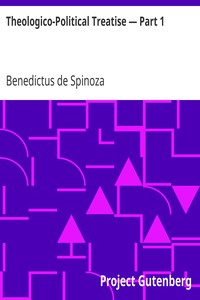Theologico-Political Treatise — Part 1 by Benedictus de Spinoza
"The Theologico-Political Treatise — Part 1" by Benedictus de Spinoza is a philosophical treatise written in the 17th century, engaging with issues surrounding religion, prophecy, and the role of divine authority in political matters. The opening chapters establish a framework for understanding prophecy, the nature of divine law, and the peculiar relationship between the Hebrews and God. Spinoza argues for a rational interpretation of religion, suggesting that many traditional beliefs are rooted
in superstition rather than reason. The opening of the treatise presents Spinoza's exploration of prophecy, where he delineates its definition, the nature of prophets, and the distinction between true prophecy and mere imagination or superstition. He emphasizes that insights and revelations provided to prophets do not grant them greater wisdom but are influenced by their personal perspectives and emotions. Moreover, he questions whether the gift of prophecy was unique to the Hebrews, asserting that true divine revelation arises from understanding and moral living, rather than knowledge or intellect. This analysis prompts readers to reconsider traditional thoughts surrounding religious belief and political authority, inviting an approach grounded in reason and critical thought. (This is an automatically generated summary.)
Read or download for free
| How to read | Url | Size | |||
|---|---|---|---|---|---|
| Read now! | https://www.gutenberg.org/ebooks/989.html.images | 204 kB | |||
| EPUB3 (E-readers incl. Send-to-Kindle) | https://www.gutenberg.org/ebooks/989.epub3.images | 153 kB | |||
| EPUB (older E-readers) | https://www.gutenberg.org/ebooks/989.epub.images | 152 kB | |||
| EPUB (no images, older E-readers) | https://www.gutenberg.org/ebooks/989.epub.noimages | 144 kB | |||
| Kindle | https://www.gutenberg.org/ebooks/989.kf8.images | 293 kB | |||
| older Kindles | https://www.gutenberg.org/ebooks/989.kindle.images | 282 kB | |||
| Plain Text UTF-8 | https://www.gutenberg.org/ebooks/989.txt.utf-8 | 194 kB | |||
| Download HTML (zip) | https://www.gutenberg.org/cache/epub/989/pg989-h.zip | 143 kB | |||
| There may be more files related to this item. | |||||
Similar Books
About this eBook
| Author | Spinoza, Benedictus de, 1632-1677 |
|---|---|
| Translator | Elwes, R. H. M. (Robert Harvey Monro), 1853- |
| Title | Theologico-Political Treatise — Part 1 |
| Note | Wikipedia page about this book: https://en.wikipedia.org/wiki/Tractatus_Theologico-Politicus |
| Note | Reading ease score: 52.6 (10th to 12th grade). Somewhat difficult to read. |
| Credits | Joseph B. Yesselman. HTML version by Al Haines. |
| Language | English |
| LoC Class | B: Philosophy, Psychology, Religion |
| Subject | Philosophy and religion -- Early works to 1800 |
| Subject | Free thought -- Early works to 1800 |
| Subject | Political science -- Early works to 1800 |
| Category | Text |
| EBook-No. | 989 |
| Release Date | Jul 1, 1997 |
| Most Recently Updated | Jan 6, 2021 |
| Copyright Status | Public domain in the USA. |
| Downloads | 726 downloads in the last 30 days. |
| Project Gutenberg eBooks are always free! | |


